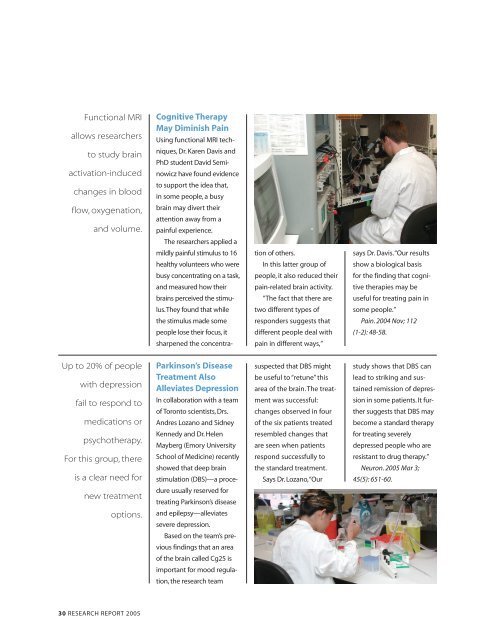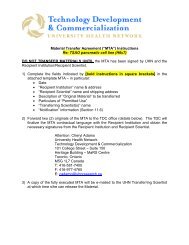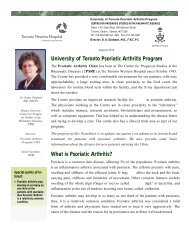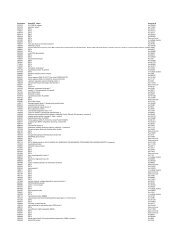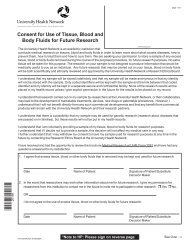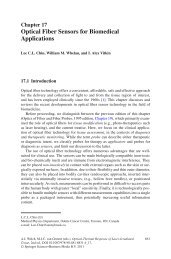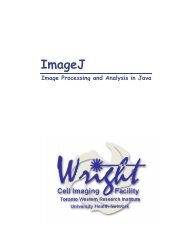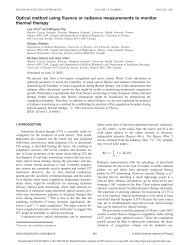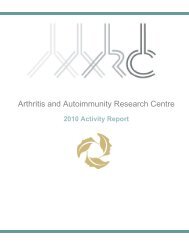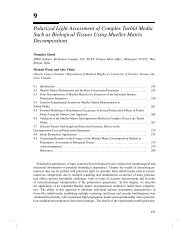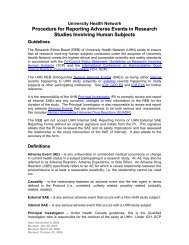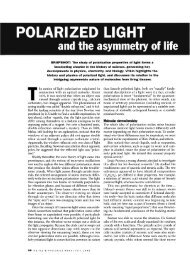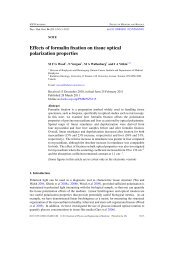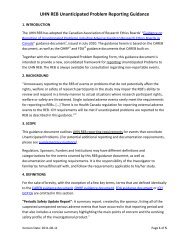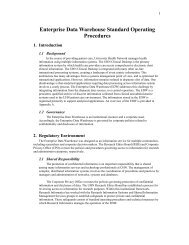Download the 2005 pdf - UHN Research
Download the 2005 pdf - UHN Research
Download the 2005 pdf - UHN Research
Create successful ePaper yourself
Turn your PDF publications into a flip-book with our unique Google optimized e-Paper software.
Functional MRI<br />
allows researchers<br />
Cognitive Therapy<br />
May Diminish Pain<br />
Using functional MRI tech-<br />
to study brain<br />
activation-induced<br />
niques, Dr. Karen Davis and<br />
PhD student David Seminowicz<br />
have found evidence<br />
changes in blood<br />
to support <strong>the</strong> idea that,<br />
in some people, a busy<br />
flow, oxygenation,<br />
and volume.<br />
brain may divert <strong>the</strong>ir<br />
attention away from a<br />
painful experience.<br />
The researchers applied a<br />
mildly painful stimulus to 16<br />
tion of o<strong>the</strong>rs.<br />
says Dr. Davis.“Our results<br />
healthy volunteers who were<br />
In this latter group of<br />
show a biological basis<br />
busy concentrating on a task,<br />
people, it also reduced <strong>the</strong>ir<br />
for <strong>the</strong> finding that cogni-<br />
and measured how <strong>the</strong>ir<br />
pain-related brain activity.<br />
tive <strong>the</strong>rapies may be<br />
brains perceived <strong>the</strong> stimu-<br />
“The fact that <strong>the</strong>re are<br />
useful for treating pain in<br />
lus.They found that while<br />
two different types of<br />
some people.”<br />
<strong>the</strong> stimulus made some<br />
responders suggests that<br />
Pain. 2004 Nov; 112<br />
people lose <strong>the</strong>ir focus, it<br />
different people deal with<br />
(1-2): 48-58.<br />
sharpened <strong>the</strong> concentra-<br />
pain in different ways,”<br />
Up to 20% of people<br />
with depression<br />
Parkinson’s Disease<br />
Treatment Also<br />
Alleviates Depression<br />
suspected that DBS might<br />
be useful to “retune” this<br />
area of <strong>the</strong> brain. The treat-<br />
study shows that DBS can<br />
lead to striking and sustained<br />
remission of depres-<br />
fail to respond to<br />
medications or<br />
In collaboration with a team<br />
of Toronto scientists, Drs.<br />
Andres Lozano and Sidney<br />
ment was successful:<br />
changes observed in four<br />
of <strong>the</strong> six patients treated<br />
sion in some patients. It fur<strong>the</strong>r<br />
suggests that DBS may<br />
become a standard <strong>the</strong>rapy<br />
psycho<strong>the</strong>rapy.<br />
Kennedy and Dr. Helen<br />
Mayberg (Emory University<br />
resembled changes that<br />
are seen when patients<br />
for treating severely<br />
depressed people who are<br />
For this group, <strong>the</strong>re<br />
is a clear need for<br />
School of Medicine) recently<br />
showed that deep brain<br />
stimulation (DBS)—a proce-<br />
respond successfully to<br />
<strong>the</strong> standard treatment.<br />
Says Dr. Lozano,“Our<br />
resistant to drug <strong>the</strong>rapy.”<br />
Neuron. <strong>2005</strong> Mar 3;<br />
45(5): 651-60.<br />
new treatment<br />
dure usually reserved for<br />
treating Parkinson’s disease<br />
options.<br />
and epilepsy—alleviates<br />
severe depression.<br />
Based on <strong>the</strong> team’s previous<br />
findings that an area<br />
of <strong>the</strong> brain called Cg25 is<br />
important for mood regulation,<br />
<strong>the</strong> research team<br />
30 RESEARCH REPORT <strong>2005</strong>


